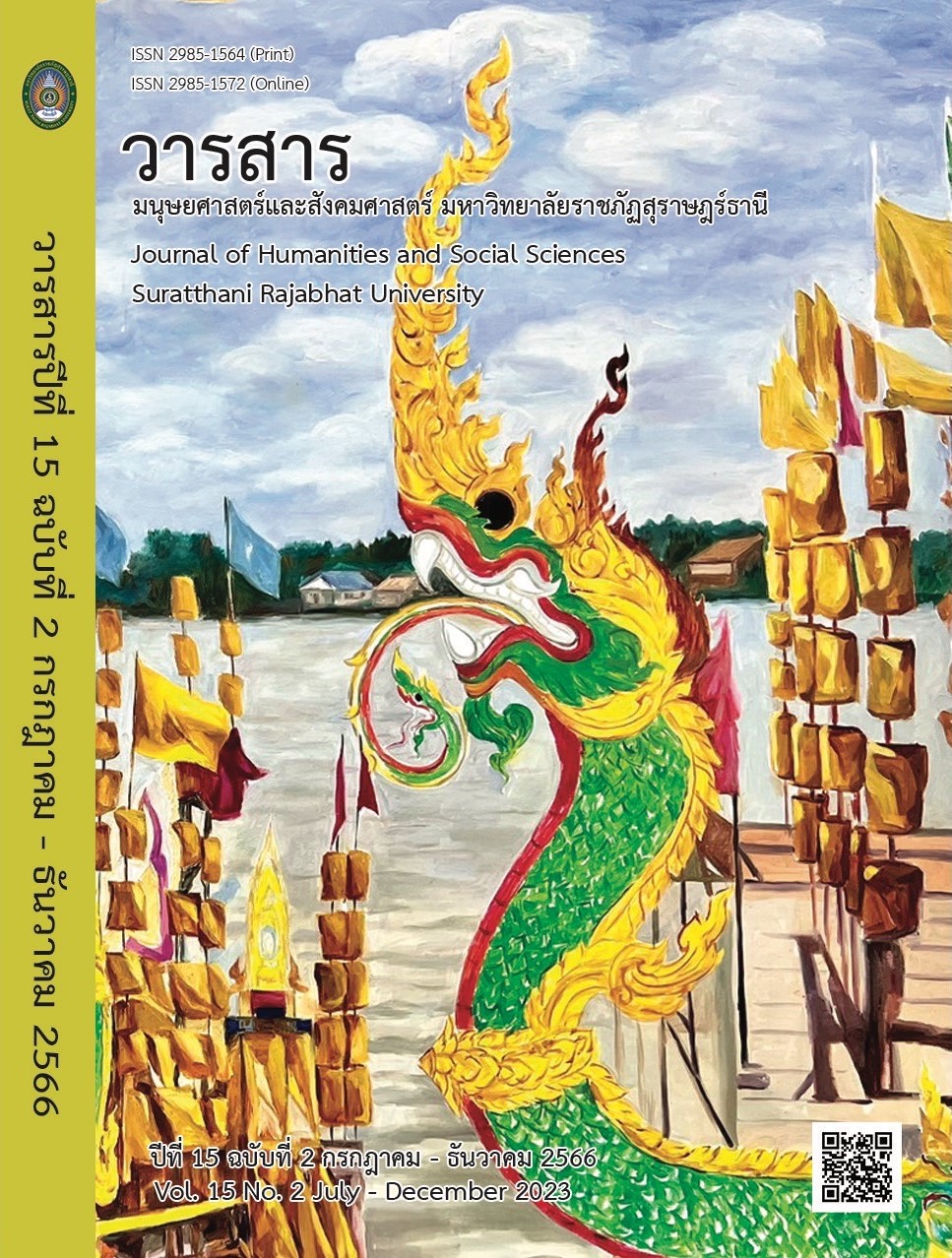Wearing Shoes from a Folklore Perspective
Main Article Content
Abstract
The research objectives are to analyze 1) why the ancient Greek philosopher Socrates did not wear shoes all his life and 2) why the kings of many countries cannot walk with bare feet. The reason why Socrates did not wear shoes all his life was revealed by the results: ancient beliefs dictated that the gods were all so radiant and hot that if mere mortals saw them, they would be burned to ashes. Therefore, every time the Gods descend to earth, they must disguise themselves as different types of beings. Wearing shoes can prevent them from touching the ground directly, which became a symbol of the Gods and a means of classification between the nobility and the ordinary people. Shaivism's belief that the monarch is a God and not a human being causes the inability of monarchs in many countries to walk barefoot. It has given rise to the customs and traditions of the Thai, Burmese, Cambodian, and Vietnamese royal courts, such as maintaining the purity of the palaces and those in the royal residences of the kings, forbidding the familiar people to look at or touch the kings, preventing all parts of the monarch's body from touching or falling to the ground, and including the conventional regulation that the king must wear shoes while traveling to various places to prevent conflagration.
Article Details

This work is licensed under a Creative Commons Attribution-NonCommercial-NoDerivatives 4.0 International License.
All published manuscripts have been verified by peer-peer professors in the fields of humanities and social sciences. Reprinting of the article must be authorized by the editorial staff.
References
กิ่งแก้ว อัตถากร. (2553). เอกสารการเรียนการสอนรายวิชา 776603 หัวข้อพิเศษทาง
คติชนวิทยา (Selected Topics in Folklore) ภาคการศึกษาที่ 2 ปีการศึกษา
-2554. พิษณุโลก: มหาวิทยาลัยนเรศวร.
กิ่งแก้ว อัตถากร. (2558). บางเรื่องจากข้อคิดงานเขียนประกอบการสอนวิชาคติชนวิทยา.
พิษณุโลก: มหาวิทยาลัยนเรศวร.
คึกฤทธิ์ ปราโมช, ม.ร.ว. (2538). คึกฤทธิ์พูด. กรุงเทพฯ: เจ.ฟิล์ม.
คึกฤทธิ์ ปราโมช, ม.ร.ว. (2544). สามก๊กฉบับนายทุน ตอน เบ้งเฮ็กผู้ถูกกลืนทั้งเป็น (พิมพ์
ครั้งที่ 3). กรุงเทพฯ: ดอกหญ้า 2000.
คึกฤทธิ์ ปราโมช, ม.ร.ว. (2548). ฝรั่งศักดินา. กรุงเทพฯ: นานมีบุ๊คพับลิเคชั่นส์.
คึกฤทธิ์ ปราโมช, ม.ร.ว. (2553). สามนคร. นนทบุรี: ดอกหญ้า 2000.
คึกฤทธิ์ ปราโมช, ม.ร.ว. (2556ก). ถกเขมร. นนทบุรี: ดอกหญ้า 2000.
คึกฤทธิ์ ปราโมช, ม.ร.ว. (2556ข). สามก๊กฉบับนายทุน ตอน โจโฉ นายกฯ ตลอดกาล
(พิมพ์ครั้งที่ 13). นนทบุรี: ดอกหญ้า 2000.
คึกฤทธิ์ ปราโมช, ม.ร.ว. (2557). เรื่องของลัทธิและนิกาย. นนทบุรี: ดอกหญ้า 2000.
คึกฤทธิ์ ปราโมช, ม.ร.ว. (2561). พม่าเสียเมือง (พิมพ์ครั้งที่ 19). นนทบุรี: ดอกหญ้า 2000.
เจือง ถิ หั่ง. (2561). สุราปกรณัม. เชียงใหม่: ลานนาการพิมพ์.
เจือง ถิ หั่ง. (2562). กำเนิดพรหมจารี: กรณีศึกษาเปรียบเทียบนิทานเวียดนาม
เรื่อง “เสาะเสื่อ” กับนิทานไทยเรื่อง “ท้าวเต่า”. เชียงใหม่: ลานนาการพิมพ์.
โจเซฟ แคมพ์เบลล์, และ บิลล์ มอยเยอร์ส. (2551). พลานุภาพแห่งเทพปกรณัม [The
Power of Myth] (พิมพ์ครั้งที่ 2) (บารนี บุญทรง, ผู้แปล). นนทบุรี: อมรินทร์
พริ๊นติ้งแอนด์พับลิชชิ่ง.
พระมงกุฎเกล้าเจ้าอยู่หัว, พระบาทสมเด็จ. (2521). รวมเรื่องพระร่วง พระราชนิพนธ์
พระบาทสมเด็จพระมงกุฎเกล้าเจ้าอยู่หัว. กรุงเทพฯ: มูลนิธิมหามกุฎราช
วิทยาลัย ในพระบรมราชูปถัมภ์.
เพลโต. (2550). วันสุดท้ายของโสคราตีส [The last days of Socrates] (กิ่งแก้ว อัตถากร,
ผู้แปล). นนทบุรี: อมรินทร์พริ้นติ้งแอนด์พับลิชชิ่ง.
เพลโต. (2555). ซิมโพเซียม [Symposium] (กิ่งแก้ว อัตถากร, ผู้แปล). นนทบุรี: อมรินทร์
พริ้นติ้งแอนด์พับลิชชิ่ง.
ศักดิ์ศรี แย้มนัดดา. (2547). ภารตนิยาย. กรุงเทพฯ: ภาพพิมพ์.
เสฐียรโกเศศ. (2512). พันหนึ่งทิวา. กรุงเทพฯ: อักษรไทย.
เสฐียรโกเศศ-นาคะประทีป. (2551). หิโตปเทศ. กรุงเทพฯ: ศยาม.


